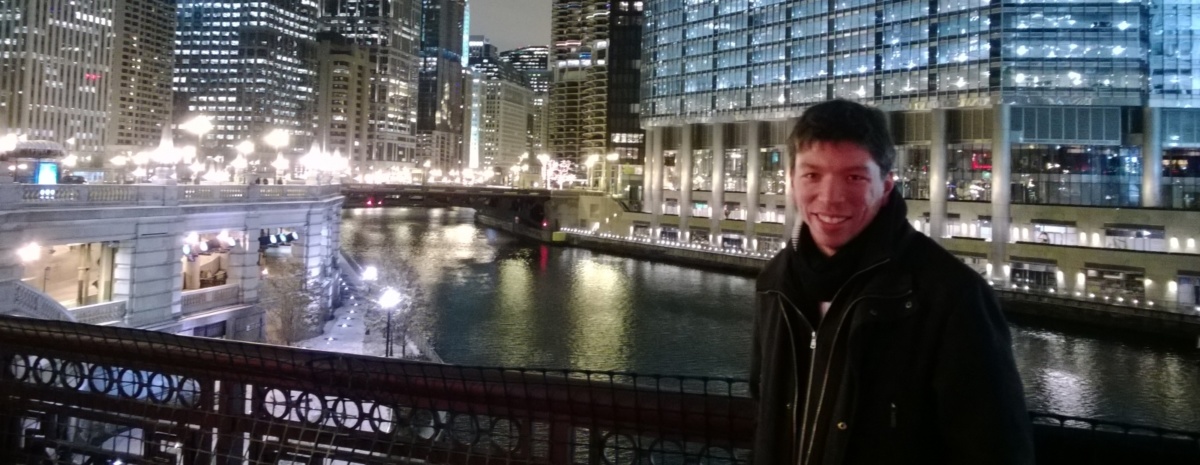I’m a terrible European. Unlike my parents, I only speak English, and have never lived in any European country outside of the UK. The world around me is overwhelmingly British and American: friends, TV programmes, films, books, social networks, news, politics, all of it. Years ago, when I visited Robert in California, he said that living in the US had made him discover his hidden ‘European’ identity: the things we have in common as opposed to the Americans. I really wish I could say the same for me, but it’s just not true.
I can think of lots of nice things to say about ‘Europe’ – the place, its people – but they are vague generalisations, and I lack any confidence that they apply in Hamburg as in Bucharest as in Rhodes or wherever. Yes, all national myths are fantasies: but my British fantasies are instinctive. I ‘know’ that Britain is a country like this, with a people like that, even if these assertions break down under serious scrutiny. It doesn’t matter. It’s about the identity, and the sense of belonging, not the facts.
I’m thinking about this, obviously, because the date of the UK’s referendum on its membership of the European Union has been announced. As it happens, I should be in London on 23 June, so I will be able to vote in person. And while I do plan to think about it, and listen to the arguments, it’s very hard to imagine I won’t vote to stay. But I am surprised at how sad I feel about it – how obvious the hole is where my heartfelt sense of European identity should be.
And I don’t think this is just a British problem. Yes, of course it is true that Britain – the island nation – is uniquely detached from its neighbours. Of course those European countries who speak each other’s languages, and share borders, and still remember how easily armies marched across them, are driven to shared institutions with greater inevitability and less fuss. But I have yet to meet a French person who didn’t feel French, or a German who didn’t feel German. Maybe I am imposing my categories onto them, but Europe’s failure to respond to the great moral test of our time – the migration crisis – in anything like a coordinated fashion suggests that at the end of the day, the nation state still rules everything.
The campaign to remain in the EU likes to describe leaving as a jump in the dark for the UK. It would be, and I think it is motivated largely (though not entirely) by bad instincts and silly conceits. But in truth, a vote to stay is also a leap in the dark. Because we can’t go on like this. For the European Union to avoid paralysis whenever anything difficult comes up, there has to be some meaningful sense of European identity, some patriotic glue which holds people together in something more than a trade pact. I don’t think this means a United States of Europe, or that national identities are about to disappear, and any bureaucratic attempt to engineer a common culture will surely fail. Honestly, I find it hard to even imagine what the EU should look like. But I hope that a vote to remain gives us longer to figure it out.
To: pdimoldenberg @ quatro-consults.co.uk
Cc: andy.hull @ islington.gov.uk; theresa.debono @ islington.gov.uk; richard.greening @ islington.gov.uk
To whom it may concern,
I recently received a leaflet informing local residents of a planning application on behalf of Arsenal stadium to increase the number of ‘rap, hip-hop and rock concerts’ taking place each year from three to nine. It would be fair to describe the leaflet as strongly negative in tone, going so far as to suggest that ‘tens of thousands of Islington residents will have their Friday, Saturday and Sunday evenings ruined on three weekends in July or August’.
In the interests of full disclosure, I have no personal or financial relationship with Arsenal. I have never attended a stadium-sized rap, hip-hop or rock concert, nor do I have any plans to do so. Meanwhile, I reside about as close to Arsenal’s stadium as is possible without living in a railway station (something which I do not recommend) and my working hours are 9am-6pm, Mon-Fri. (I mention this fact solely to highlight that I presumably fall into the category of residents for whom ‘hours of loud music’ may ‘make it impossible to relax and prepare for work’ according to the leaflet – although I suppose that this only really applies in relation to Sunday concerts.)
However, in the interests of civic duty I shall now attempt to put aside these personal factors to perform a disinterested analysis of the question at hand: should planning permission for such an extension be granted?
We must begin with some philosophical assumptions. Although Bentham’s utilitarian desire of the “greatest happiness of the greatest number” cannot give a full picture of our moral responsibilities as human beings, it should nonetheless provide a rough and ready guide to the costs and benefits of local planning disputes. Furthermore, I shall ally this axiom with an assumption of equal human worth: I will assume, in a democratic spirit, that each person’s happiness is of equal value. Given that the objections raised in this leaflet almost entirely concern noise levels, I also intend to ignore economic concerns and concentrate simply on weighing ‘sound causing happiness’ against ‘sound causing unhappiness’.
Firstly, the benefits. Arsenal stadium has a capacity of roughly 60,000. It is reasonable to assume that (almost) all those attending a rap, hip-hop or rock concert enjoy the sound of these events, so the application to increase by six evenings equates to 360,000 collective evenings of enhanced happiness if we assume full stadium capacity. (Is it reasonable to make this assumption? I have checked this with someone familiar with such events, and he believes that it is – any further information would be greatly appreciated.) Now we need to make some measure of ‘how much’ extra happiness is generated. This is necessarily difficult to quantify, but I will assume that an evening at a concert which one has chosen to attend would bring a 50% uplift in happiness as measured against a baseline evening. In the round, I hope this does enough to balance sentiments of ‘I thought Coldplay were disappointing this time’ against ‘watching Coldplay, I approached true ecstasy’.
Now to the costs side of the equation. The population of Islington is about 200,000, with an area of roughly 15 square kilometres. I am no expert in sound levels (again, external contributions to the analysis would be warmly received) so will assume what I believe to be a fairly generous 1km radius of affected area around Arsenal stadium, or an area of 3.14 square kilometres and about 42,000 residents. (Yes, I have assumed an equal distribution of residents across the borough. There are only so many hours in the day.) Of course, not all residents would be in their homes during the evenings specified – particularly given the days involved – but then again, others might have guests over. (In fact, the problem of guests is specifically raised by those issuing the leaflet as concerts may make it “difficult for friends / delivery vans to visit”. As a side note, delivery vans on Friday, Saturday and Sunday evenings strike me as a niche problem.)
Estimating the loss of happiness to these 42,000 people is challenging, as – unlike the concert attendees – they are not self-selecting with regard to the concerts. The leaflet I have received talks of “ruined” evenings, but this is a subtly unhelpful term as it implies a near 100% reduction in happiness measured against what you might have hoped for over an evening, rather than what (on average) you actually get. (Indeed, I would conjecture that an individual whose enjoyment was actually, in a strictly technical sense, ‘ruined’ by the sound of a music concert – that is, their temporal happiness was so eroded as to induce genuine misery – would also be susceptible to many other threats to their happy evenings.)
However, we may be spared the necessity of in-depth calculations as our numbers have already revealed an impressive 360,000 collective evenings of enhanced happiness against 252,000 collective evenings of reduced happiness. Sticking with an assumption of a 50% ‘happiness uplift’ for the concert attendees, we would need a more than 70% reduction of happiness in the average resident to equal this, on each and every one of the six evenings in question.
I respectfully submit that this is unlikely. For one thing, it assumes that an evening of increased background noise brings significantly more upset than a concert, which you have specifically chosen to attend, brings more joy. For another, it assumes that all evenings are independent of each other. This is a reasonable assumption for the concert-goers: it is unlikely that very many of them will be the same people from night to night. But the residents are largely the same people from night to night and, even for those upset by the noise, they are unlikely to face the same level of fresh misery each night, by something they are used to, and have already factored into their daily lives, as something that is relatively rare. By analogy: an Islington council tax bill, while unpleasant, is expected. A random demand for the same amount, made without any warning, would be much worse.
Therefore, on the basis of the available evidence, I respectfully petition for the proposed extension to be granted.
So that others may critique the calculations involved, I also intend to place a copy of this analysis on my blog.
Yours sincerely,
Dominic Self
I’m sure my relative quietness on education and schools recently has been a blessed relief – although for those around me it’s probably been replaced by excess chatter about Groupon deals. Anyway, for one night only I’m afraid you’ll have to endure yet more, because today was Retro Comprehensive Evangelism Day!
Having taken the morning off work, Hannah (in the @HforHannah sense) were welcomed into Latymer Upper School – as ambassadors from state school world – to talk with, and be questioned by, a group of Year 10 students. (In this we were merely following in the footsteps of other QPCSers who have done the same thing in previous years, like Marion and Miles.)
I wasn’t going to blog about the students too much, but suffice to say they were all engaged and open to discussing the whole state/private divide. Which is actually pretty brave of them, given that my aim is always to plant the idea that it doesn’t have to stay that way. You don’t have to send your own children to the same kind of institutions you were sent to – it didn’t happen to me, for a start. But it can’t be a ‘sacrifice’. We have to prove that comprehensives really can do education better, and that starts by standing up and putting a human face on a system which will never compete in power and prestige. So, yes, it was really good to speak to them – and kudos to Latymer for allowing the whole exercise in the first place.
There was a slight weird coda to the day, too. Through an unexpected work connection I ended up seeing Andy Burnham speak in Tower Hamlets tonight, and after asking my obligatory question about schools he gave a long answer which effectively summed up School Wars! Nice to know these things are all a little bit circular ![]()
Blurry photos from the pub will recommence next post. Which may or may not be written entirely on the Tube home…
So, yesterday a bunch of us went to protest against the Pope’s state visit to the UK. You may have heard about it. Suffice to say, there was a wonderful and good-natured atmosphere – and on a totally unpolitical note, it was actually just really nice to be able to stroll through central London without being surrounded by the usual traffic. But before we get to the photos, I want to say a few words about what I felt the protest was all about, especially for those of you who don’t count yourself as one of us ‘friendly atheists’ (as my sign proclaimed).
I am serious about what I believe – and don’t believe – and certainly don’t subscribe to the view that religious topics should banned from polite conversation for fear of causing offence. In fact, I find it rather insulting to the human spirit to think that atheists and believers are incapable of having friendly debates about God without it becoming personal and nasty. Some of my best friends are committed vegetarians, communists or Tories: surprisingly enough, it is precisely because I consider them all intelligent and interesting people that I enjoy discussing such differences of opinion. Religion should be no different. The ‘each to their own’ attitude is ultimately facile, because we all have to get our ideas from somewhere – if you’re not allowed to argue your case with others you meet over your life, we will all grow up shielded from anything that might conflict with the views of our parents or immediate communities, and never have the opportunity to explore the big wide world of ideas.
But these are intellectual debates: the stuff of blog posts, books and drunken chats in the pub. It’s not that a big march designed solely to argue that God didn’t exist would be wrong as such – and might indeed be necessary in cultures where atheism has no public recognition or acceptance. But that’s hardly the case in Britain, and there’s an obvious limit to how far chants and slogans can effectively convey a set of arguments about metaphysics. So Protest The Pope was not an ‘anti-faith’ rally, even if some of those participating would have felt that way. Protest The Pope was just that: taking a stand against a tax-payer funded ‘state’ visit of an influential man with vile views, an obnoxious agenda and – most importantly – a huge legal case to answer for his own role in covering up the systematic sexual abuse of children within his organisation.
Let’s take them each in turn. On an astonishing range of issues, Joseph Ratzinger has set himself against many of his own followers in his intolerance and dangerous irresponsibility. He refuses women access to the priesthood. He believes that gays and lesbians have an inclination towards evil by dint of their very orientation, even if they never have sex. He chose to welcome back an unrepentant Holocaust denier into the Catholic church. He opposes stem cell research. He is against contraception in all circumstances – even to prevent the spread of HIV or to limit the size of exceedingly poor families in developing countries. Indeed, he even believes that condoms are ineffective and make the problem of HIV worse: a position so utterly devoid of either evidence or empathy that I find it breathtaking that he can actually hold it.
The argument that these views are – in practice – not widely shared or followed by Catholics in this country is irrelevant. In other places, much poorer places, they are taken very seriously indeed. And even if they weren’t – what other leader with such repellent ideas would our state, in our name, welcome with such fawning adulation? We are told that the Pope is different – special – because his stance is ‘theological’ rather than political, as if he would secretly really like to embrace feminism, gay equality and contraception but is prevented from doing so by the eternal edicts of God. What I am never clear on is why I should care. Seriously… what interest is it of mine why you’ve come to believe something I consider appalling and immoral? If you hold those views, I will oppose you, full stop, end of. Clearly, thousands of people at Protest The Pope felt exactly the same.
Secondly, there’s the matter of his agenda in the UK. His argument – trotted out again and again – amounts to a withering condemnation of secularism. Secularism, need I remind you, is not atheism, but merely the separation of religion from the official life of the nation state. All religious views and forms of worship should be permitted, so long as they do not conflict with the law (and that’s one, equal law for all citizens), but the state should remain uninvolved. Atheism I will argue for, but secularism I will go out into the streets to march for, because it is one of the single most important achievements of human history. We may not have it perfectly in Britain, but in effect – most of the time – we do have it, and I firmly believe that the vast majority of religious people support its basic tenets as strongly as unbelievers.
They have very good reason to. The Pope asserts that an ‘aggressive secularism’ leads to moral decay and, astonishingly, even likens it to Nazi Germany. Only religion can provide the state with a moral backbone, he says. His detachment from reality is stark. My family on my mother’s side is Jewish – my grandfather left Germany for Britain as a boy. If he had stayed, he would have been killed. He would not have been murdered by secularists. He would not have been murdered by people who believed passionately in the separation of church and state. He would have been murdered by those in power who were about as far from indifferent to religion as it is possible to get – by people who ended up directing the entire state apparatus towards the attempted extermination of one particular religious group in the name of another.
But secularism isn’t just a response to the atrocities of the past. Can anyone seriously look around the world today and claim they’d be happier living in a theocratic state over a secular democracy? Would the moralising power of religion really prove comforting as you awaited death by stoning in Iran? Do you think you’d be able to preach from your Bible for very long in Saudi Arabia? Even where the power of religious institutions is only partial, it can be devastating. Go have an abortion in Brazil. Even in the constitutionally secular United States, the explosive controversy over the Islamic centre in New York was a terrifying reminder that any deviation from secularism usually hurts religious people the most. (If would be nice if people such as Alexander Tefft, who rails against secular society on an almost-weekly basis, considered for a moment that the fight – and it really was a fight – to free the state from religion is the only reason that he is allowed to preach Orthodox Christianity in the UK in peace. A little gratitude, even, wouldn’t go amiss – but then again, secularism protects the ignorant as much as anybody else.)
So when the Pope takes advantage of his (secular) rights to free speech to insult and belittle the very foundations of the society I want to live in, I absolutely will protest. But the spark which really ignited Protest The Pope is the sick joke that, whilst he comes over at our expense to declare us to be immoral, his organisation continues to take advantage of its theocratic status at the Vatican to protect child abusers by not handing over its full archives to civil authorities. He may express his sorrow, but that does not exonerate the Pope of his personal role in the cover-up of the affair, a story which is rather too long for this already over-long post but which, if you’re interested, is fully explored elsewhere. It’s grim reading.
This is the case against the Pope. It’s not an atheist case per se, although it is an assertion that atheists refuse to be marginalised in society as ‘aggressive’ or ‘immoral’, and will not shut up just because we are told to. It’s certainly not ‘anti-Catholic’: indeed, one of the most significant speeches came from a Catholic priest from New York, who came out as gay after witnessing the death and loneliness inflicted on his flock by the Vatican’s attitudes to homosexuality and contraception. But it is secular, and proudly so. I hope that as many people as possible feel able to get behind it, and reject Ratzinger’s pious condemnation of a society which – for all its faults – is a thousand times richer than his dark vision of a return to religious supremacy.
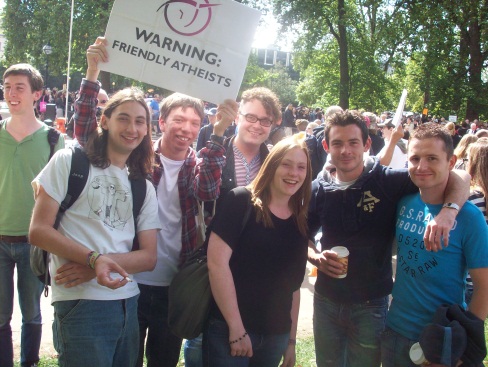
Warning: Friendly Atheists!

Condoms save lives
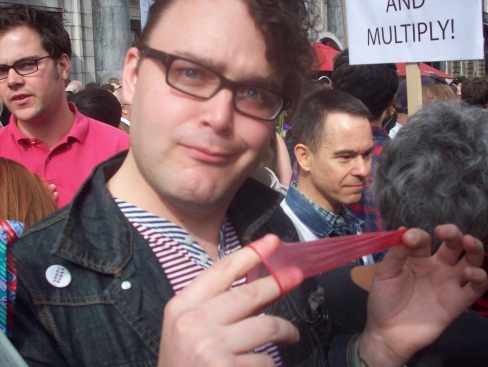
Also, condoms are great fun to blow up as balloons
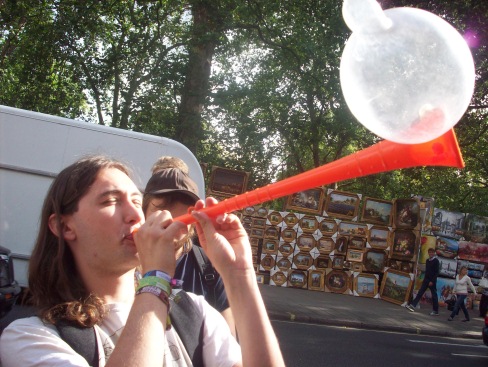
No, really, it’s true
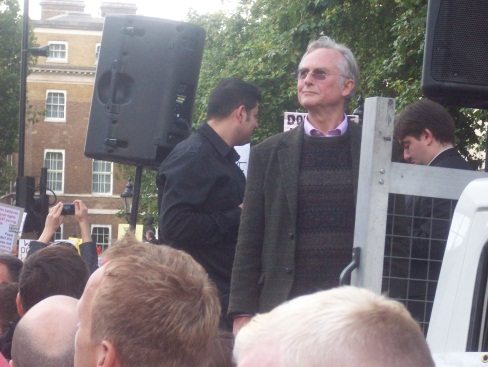
Richard Dawkins surveys his followers (joking, joking)
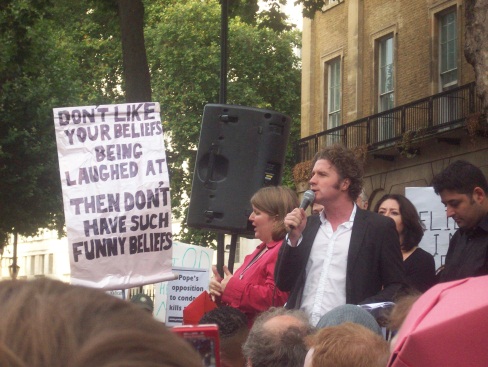
The amazing Ben Goldacre, who later signed my sign
From: Dominic Self
To: macer.hall@express.co.uk
Sent: Tue 13/07/2010 16:55
Subject: Request for comment
Dear Mr. Hall,
I am writing in advance of publishing a short comment piece on my blog about your front-page article in today’s Daily Express, headlined ‘ONE IN 5 BRITONS WILL BE ETHNICS’.
In particular, I was wondering if you could let me know what you envisage the remaining 80% of British society as being composed of? I had always assumed that human beings were universal possessors of ethnicity, but clearly I am mistaken in this regard. Could you identify the key characteristics of ‘an ethnic’, please?
On a personal note, I trust you will understand that any critical tone which I may take in my coverage of you will be purely in the interests of sensation and the courting of controversy. So if, for example, I were to describe you personally as ‘nasty’, or ‘revolting’, or ‘cowardly’, or ‘squalid’ – or, indeed, all of these things and more – rest assured that this would all be in the public interest and should be taken in a warm spirit of open dialogue and discussion.
Wishing you a pleasant evening,
Sincerely yours,
Dominic Self
Sadly, no response from the nasty, revolting, cowardly and squalid man at the nasty, revolting, cowardly and squalid newspaper has yet been received. Shame.
